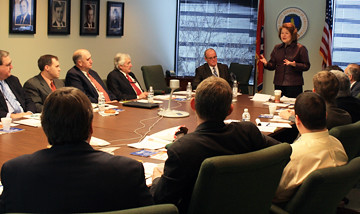USDA Business and Cooperative Programs Administrator Judith Canales convened a roundtable of renewable energy experts from the southeast in Nashville on January 26, to discuss development and marketing of bioenergy technologies and advanced biofuels.
Despite an unexpected snow the night before, participants traveled in from Memphis and Knoxville as well as Middle Tennessee. FSA and Rural Development State Directors Gene Davidson and Bobby Goode hosted the Administrator and Ed Harlan of the Tennessee Department of Agriculture, Louis Buck of Tennessee Biomass Supply Cooperative, Pete Nelson of Memphis Bioworks, Atha Comiskey and Bart Comiskey of Clean Cities of Middle Tennessee, Paul Melgaard of Eco Energy, Terry Ruse of Clean Fuels Development Coalition, Warren Nevad of the Tennessee Renewable Energy Economic Council, Dan Stasser of the Tennessee Department of Agriculture, Stan Boyd and David Owenby of the Tennessee Department of Transportation and Rural Development Tennessee Energy Programs Coordinator Will Dodson.
Canales opened the forum with the idea that, "By making renewable energy sources commercially viable based on feed stock available in each region of the country, we create sustainable opportunities for job creation and economic development, and keep more energy dollars in the community."
The spirited discussion covered a range of challenges on the horizon for the emerging bioenergy industry from traditional fuel providers to misperceptions about the tradeoff between food and fuel crops. Canales emphasized that changes are coming to the USDA energy programs that will allow applications to be submitted year round and to encourage geographic and technological diversity.
Canales and others brought up the regional nature of biofuel production. Regionally significant feed stocks mentioned included cellulosic switch grass, wood pulp and sucrose-rich crops.
With the commercial availability of existing flex fuels growing rapidly, participants called for a fresh examination of regulations intended to encourage their use. "Greater use helps drive down production costs and will encourage more stations to carry fuels like E20, E30 and E85 as they come online," said Goode. "We can help drive the change to cleaner fuels by doing more to take advantage of flex fuels in fleet vehicles and by educating consumers on the benefits of using more renewable American-made energy resources."
Coop Manager Louis Buck said that with the advances being made in bioenergy production today he looks forward to a time when farmers send power down wires to the city and get a check delivered back in the mail. Electronic mail, presumably.
During the roundtable, Canales also announced the award of a $25,000 Rural Energy for America (REAP) grant to the Tennessee Biomass Supply Cooperative. According to Buck, "The investment will be used for research into commercializing a new, more efficient technology for generating hydrogen from what is typically regarded as low-potential biomass feed stock."
To find out more about USDA Renewable Energy programs and how they can benefit your business, click here.




